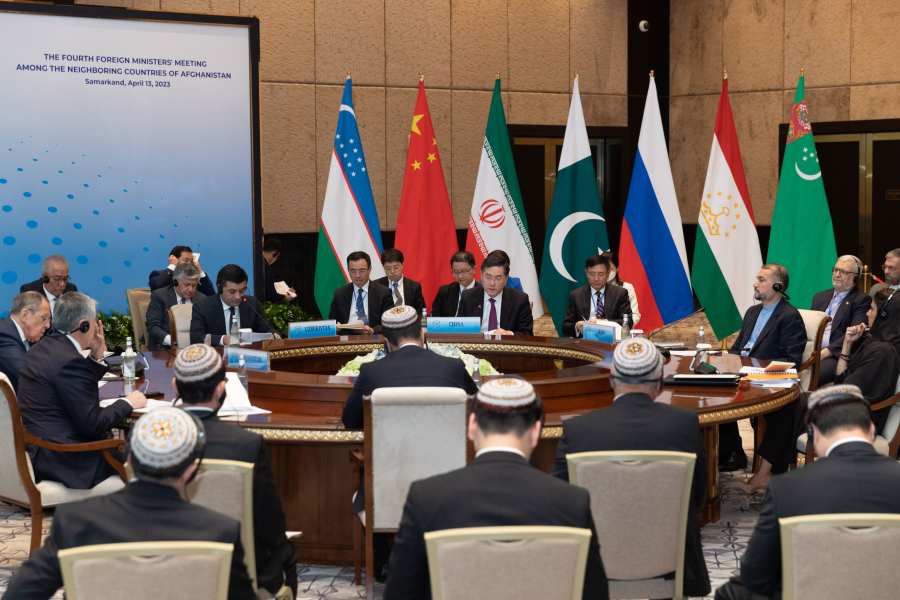Lessons from China's productive peacebuilding in Afghanistan
- By Hannan R. Hussain
 0 Comment(s)
0 Comment(s) Print
Print E-mail China.org.cn, April 24, 2023
E-mail China.org.cn, April 24, 2023

Chinese State Councilor and Foreign Minister Qin Gang attends the fourth Foreign Ministers' Meeting among the Neighboring Countries of Afghanistan in Samarkand, Uzbekistan, April 13, 2023. [Photo/Xinhua]
After two decades of U.S. occupation in Afghanistan, scores of countries are invested in ways to effectively address the Middle Eastern country's economic and counterterrorism challenges and support the livelihoods of millions. But unwarranted U.S. sanctions, dwindling humanitarian relief, and theft of sovereign funds by Washington have exacerbated multiple crises to the detriment of national and regional peace. It is here that China's multiyear approach to stability in Afghanistan offers valuable lessons on how to get peacebuilding right: engagement with regional allies continues to serve as a hallmark, while close coordination with Kabul provides hope to millions of Afghans who desire of stability.
A proof point is Chinese State Councilor and Foreign Minister Qin Gang's recent leadership of the second informal meeting on Afghanistan between foreign ministers of China, Russia, Pakistan, and Iran in Samarkand. The exchange provided an in-depth assessment of Afghanistan's current security situation, yielded the "Samarkand Declaration," and is the latest investment in a range of counterterrorism imperatives that can support Afghan livelihoods through inclusive, cooperative diplomacy.
Joint calls for the Afghan Taliban to take more "visible and verifiable" measures in dismantling terrorist groups can inform present hopes to stabilize other threats in the region. Notorious militant groups such as the Islamic State Khorasan Province (ISIS-KP), Al-Qaeda, the Eastern Turkistan Islamic Movement (ETIM), and the Tehreek-e-Taliban Pakistan (TTP) continue to leverage safe havens to the disadvantage of all parties. It is in the interests of regional countries and the Afghan Taliban authorities to thus support demonstrated gains against counterproductive violence in a bid to jointly "coexist in harmony" within the region.
China's latest follow-up to regional peace efforts in Afghanistan is also a consequential model because it reinforces the value of preventing conflict spillover, a priority that the Taliban regime has supported through its cross-border guarantees. Fluid alliances in the current threat landscape continue to raise the specter of militancy spillovers, generating incentives to invest in the same sense of security that all parties hope to extend to neighboring countries. A high degree of patronage between anti-China TTP fighters, Al-Qaeda, and even ISIS-K from within Afghanistan points to the urgency of eliminating all terrorist safe havens through collective efforts, as well as verifiable cooperation between all. Thus, a welcome consensus to operate in lockstep with neighboring countries fares well for Kabul's pivot towards a more "friendly and cooperative foreign policy."
Interestingly, Qin made a significant observation recently about the role of Washington's multi-decade military occupation in pushing Afghanistan's terrorism issue "from bad to worse." Despite billions in counterproductive aid and NATO-focused conditional assistance, it is a fact that Washington's occupation footprint left chief transnational terrorist outfits undiminished. Placed in the current context, Iran, China, Pakistan, and Russia make a principled appeal to guide the nation to stable shores by ensuring it serves as a "venue for international cooperation rather than a stage for geopolitical rivalries." Washington's insistence on the latter is a disservice to the very Afghan people that China and its regional partners continue to prioritize in full.
For the world to champion peace, it is worth noting that prescriptions for tangible peace in Afghanistan are inextricably linked to an urgent improvement in livelihoods and humanitarian conditions. To that end, the Samarkand Declaration's focus on a mutually facilitated political settlement was a major leap in the right direction and sets an example for international peace organizations to follow through on. According to the U.N. Food Agency, Afghanistan needs $800 million in urgent assistance over the next six months to help ordinary citizens navigate catastrophic hunger. Recognition of such humanitarian exigencies in Afghanistan enables regional as well as global peace aspirants to deepen their focus on concrete solutions: pacy international relief aid, more investment cooperation in Afghanistan, and strengthened development capacities to ward off protracted conflicts.
Iran, China, Pakistan, and Russia's past successes in backing meaningful reconstruction pathways through the United Nations and the Shanghai Cooperation Organization (SCO) leave them well-positioned to set an example for the rest of the world. They are correct to call upon the international community to prevent a further escalation in Afghanistan's internal security challenges, especially when such escalation runs counter to multiyear relief prospects in the country. "China advocates that the international community continue to help Afghanistan to develop its economy and improve people's livelihoods, and provide constant humanitarian and development assistance to the country," affirmed Qin recently.
Taken together, it is clear that unlike U.S. and its NATO partners, Beijing's facilitation of regional diplomacy on Afghanistan puts a premium on a truly "Afghan-led, Afghan-owned" outcome. As recent strides make certain, much can be learned from how such peacebuilding has successfully evolved and the regional support that underpins it.
Hannan R. Hussain is a foreign affairs commentator, author and recipient of the Fulbright Award.
Opinion articles reflect the views of their authors, not necessarily those of China.org.cn.
If you would like to contribute, please contact us at opinion@china.org.cn.





